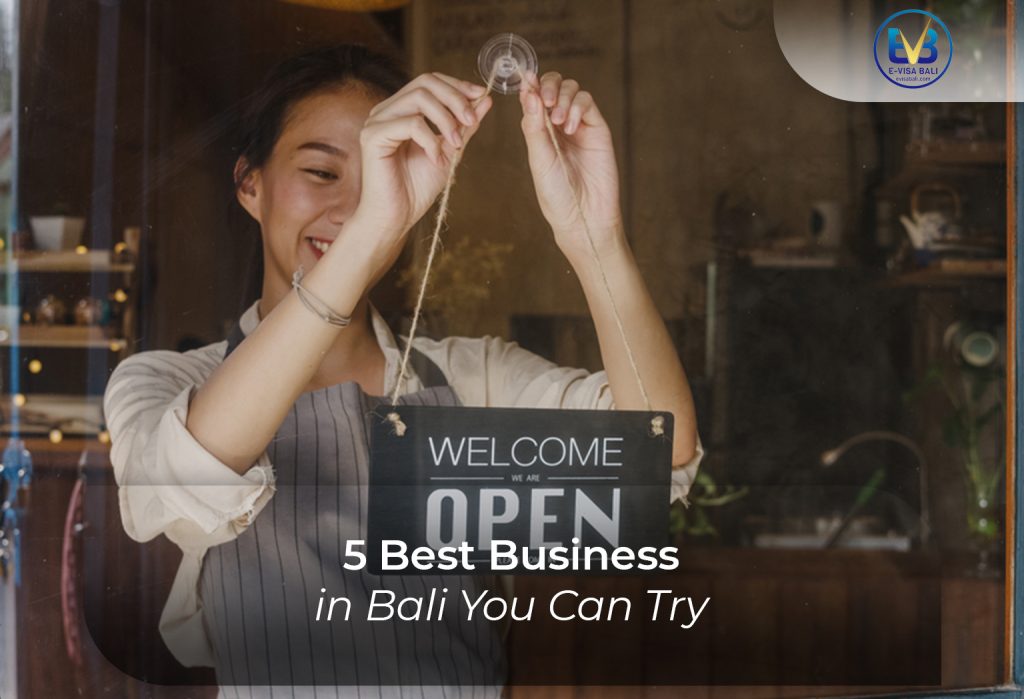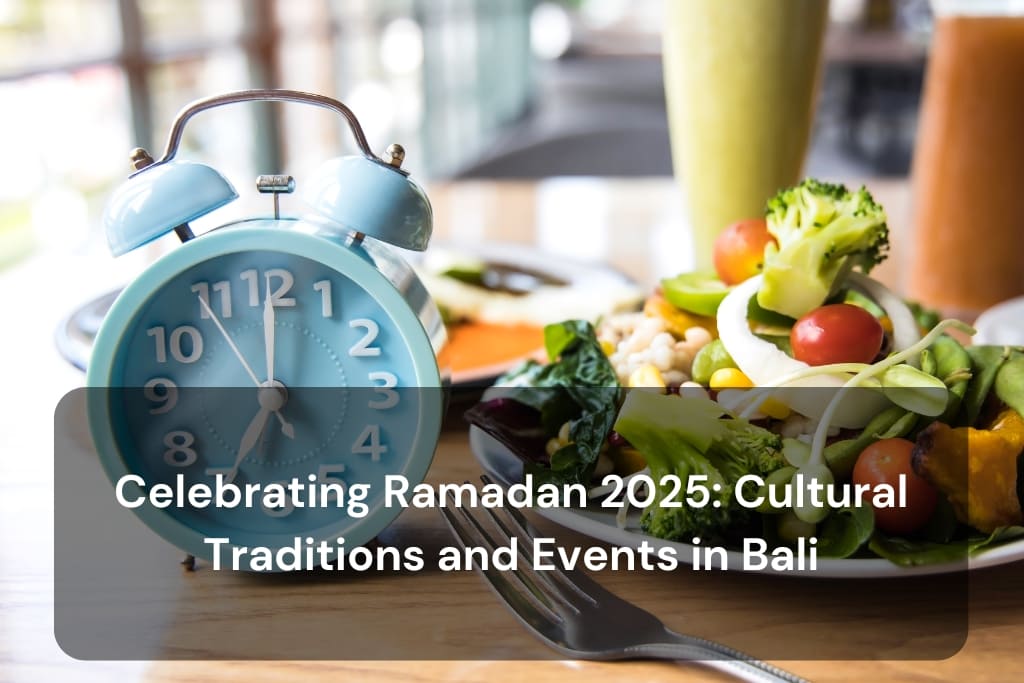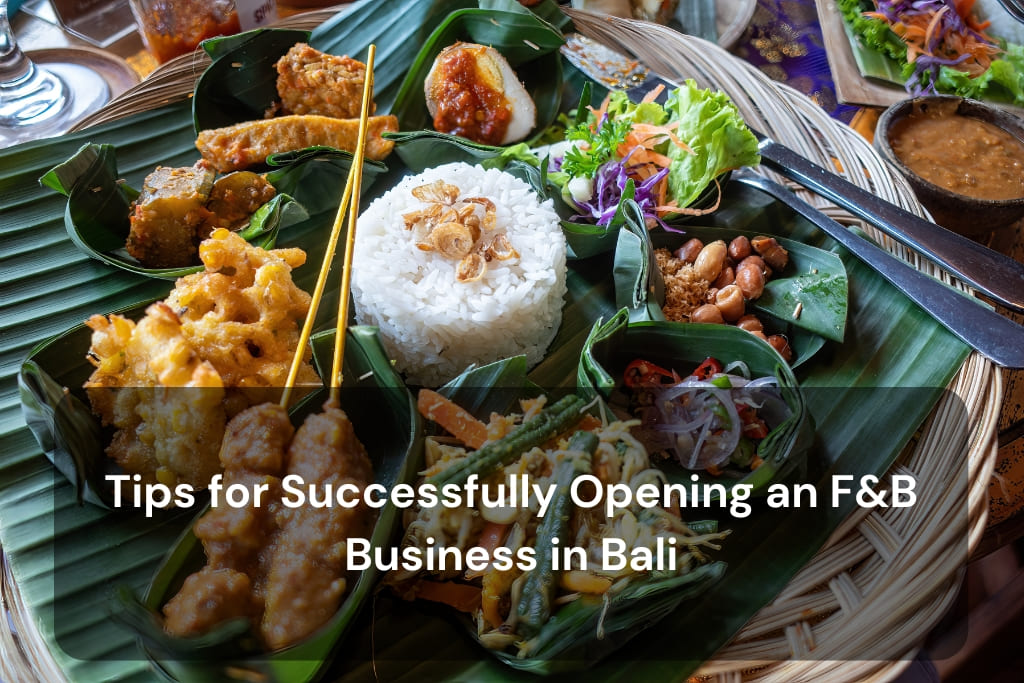5 Best Business Opportunities in Bali: A Guide for Investors

With a record-breaking 7.1 million international arrivals in 2025, Bali has officially moved beyond a simple post-pandemic “recovery” and into a high-growth era. Whether you are looking for long-term rental yields or a creative startup, the “Island of the Gods” offers some of the most lucrative ROI opportunities in Southeast Asia. However, the market is changing. It’s no longer just about “buying a villa”; it’s about building a business that follows the rules and can last. Here are the top business sectors to watch in Bali right now. 1. Property and Real Estate (The Top Performer) Property remains the “gold mine” of Bali. With land scarcity in hotspots like Canggu, Seminyak, and Uluwatu, property values continue to appreciate by 7–12% annually. 2. Experiential Food & Beverage The days of just “opening a kitchen” are over. In 2026, tourists and digital nomads want places that look good in photos and offer healthy, fresh food. 3. Creative Arts & Skill-Based Workshops Travelers now want more hands-on experiences than ever. They don’t just want to buy art; they want to create it themselves. 4. The Wellness & Fitness Boom Bali has become a world-famous place for health and wellness, similar to Los Angeles or Ibiza. This is much more than just massage shops. 5. Ethical Fashion & Handicrafts Bali’s craftspeople are famous worldwide. Starting a fashion brand here lets you use their skills and also sell your products to other countries. How to Start Your Bali Business While there is a lot of opportunity, Indonesia made its rules stricter in 2025 and 2026 to ensure all businesses are legitimate and comply with the law. 1. Market Research & Location Don’t just go where everyone else is going, like Canggu. Check the zoning rules (KKPR) for your land. Is it a “Tourism Zone” (Pink)? If not, you might not be allowed to run a rental business there. 2. Legal Setup (PT PMA) To own and operate a business as a foreigner, you typically need to establish a PT PMA (Foreign Investment Company). Pro Tip: Avoid “nominee” structures where you put a business in a local’s name. They are legally risky and progressively scrutinized by the Indonesian government. Conclusions: Work with a Professional: Starting a business in another country can be legally complicated. To protect your investment, always talk to a trusted business license consultant who knows the rules.
Travel to Bali: The Ultimate Guide for First-Time Visitors

For years, Bali has attracted millions of travelers looking for tropical beauty, culture, and remarkable experiences. From tropical beaches and breathtaking rice fields to firmly established traditions and warm local hospitality, Bali offers a unique experience hard to find anywhere else. It is not surprising that many first-time travelers to Bali end up returning and sometimes even decide to stay longer. If this is your first time planning to travel to Bali, you might have many questions. Where should you stay? When is the best time to visit? Do you need a visa? What should you prepare before arriving? In this ultimate Bali travel guide, we will walk you through everything you need to know before visiting Bali for the first time. Why Travel to Bali? There are many reasons why millions of travelers choose Bali every year.First, Bali offers beautiful beaches and tropical scenery. Whether you enjoy relaxing by the ocean, surfing the waves, or watching sunsets from a cliff, Bali has it all. Areas like Uluwatu, Seminyak, and Canggu are especially popular for their coastal charm. Second, Bali is rich in culture and traditions. Daily offerings, temple ceremonies, and traditional dances are still actively practiced by the local community. This cultural atmosphere makes visiting Bali feel more meaningful, not just like a typical beach holiday. Another reason why many people love traveling to Bali is the affordable luxury. Compared to many Western countries, you can enjoy private villas, spa treatments, and high-quality dining experiences at reasonable prices. Lastly, Bali is known for its friendly locals and English-speaking environment. Communication is generally easy, especially in tourist areas, making first-time visitors feel comfortable and welcome. Best Time to Travel to Bali Bali has two main seasons: the dry and rainy seasons. The dry season runs from April to October. This is generally considered the best time to visit Bali, especially for first-time travelers. The weather is mostly sunny, humidity levels are lower, and outdoor activities such as beach trips, hiking, and island hopping are more enjoyable and comfortable. The rainy season typically occurs from November to March. While there may be occasional heavy rain, it usually does not last all day. In many cases, the rain comes in short bursts, often in the late afternoon or evening. This season can also be less crowded and sometimes more affordable for accommodation. However, in recent years, Bali’s weather has become slightly more unpredictable. You might experience bright sunshine during the day, followed by heavy rain at night. Because of this, it is always a good idea to stay flexible with your plans and be prepared for sudden weather changes, regardless of the season. If you prefer stable sunny weather and a lively atmosphere, the dry season is ideal. If you prefer fewer tourists and better accommodation deals, the rainy season might suit you better. Entry Requirements for Visiting Bali Before you travel to Bali, make sure your passport is valid for at least six months from your arrival date. Most travelers are eligible for an e-VOA (Electronic Visa on Arrival), which allows a 30-day stay and can be extended once for another 30 days. However, please note that not all nationalities are eligible for the e-VOA. Some countries require a different type of visa before arrival. If you are unsure about your eligibility, feel free to contact us for more information. To apply for an e-VOA, you generally need to prepare the following documents: Immigration regulations may change from time to time, so it is always recommended to check the latest requirements before your trip to avoid unexpected issues upon arrival at the airport. Where to Stay in Bali for First-Time Visitors Choosing the right area can make a big difference for your first trip. Seminyak – Stylish and Central Seminyak is known for its beach clubs, stylish restaurants, and sunset spots. It is a great choice if you want to stay somewhere lively but still comfortable. Canggu – Trendy and Social Canggu attracts younger travelers and digital nomads. It is filled with cafes, coworking spaces, and surf spots. The atmosphere is energetic and modern. Ubud – Cultural and Peaceful If you prefer nature and culture, Ubud is the perfect choice. Surrounded by rice fields and temples, Ubud offers a slower and more peaceful experience. Nusa Dua – Relaxed and Resort-Oriented Nusa Dua is cleaner, more organized, and often chosen by families or travelers looking for a calm resort-style stay. Top Things to Do in Bali Visit Iconic Temples like Tanah Lot and Uluwatu Temple Tanah Lot is one of the most photographed temples in Bali. Located on a rock formation by the sea, it becomes especially beautiful during sunset when the sky turns orange and waves crash against the cliffs. Uluwatu Temple sits on a dramatic cliff overlooking the Indian Ocean. Besides the stunning views, visitors can watch the traditional Kecak dance performance in the evening. Just be mindful of the monkeys, as they are known to be quite playful. Explore the Rice Terraces in Ubud Ubud is famous for its lush green landscapes, especially the Tegallalang Rice Terraces. Walking through the rice fields offers a glimpse into Bali’s traditional Subak irrigation system. Beyond the terraces, Ubud also features art markets, yoga studios, and wellness centers that reflect Bali’s cultural side. Chase Waterfalls in North Bali North Bali is home to beautiful waterfalls such as Sekumpul and Gitgit. Reaching them may require a short trek, but the scenery and natural pools are worth the effort. This area is generally less crowded, making it perfect for nature lovers. Try Authentic Balinese Cuisine No trip to Bali is complete without tasting local dishes like Babi Guling, Ayam Betutu, and Nasi Campur. You can enjoy traditional warungs for a local experience or dine at modern restaurants offering contemporary Indonesian cuisine. Take a Day Trip to Nusa Penida Nusa Penida is known for its dramatic cliffs and crystal-clear waters. Kelingking Beach, often called “T-Rex Beach,” is one of Indonesia’s most iconic viewpoints. A day
Visa Options for Former Indonesian Citizens: How to Return and Stay Legally

The Indonesian government has officially responded to the needs of people who have decided to change their citizenship, either by marrying a citizen of another country or by becoming a citizen of another country. To help this growing group, the government introduced a special visa, the Ex-Indonesian Citizen Visa, specifically for them. With this visa, former Indonesian citizens can now return to Indonesia with more confidence and legal safety. This policy shows that Indonesia values its citizens living abroad and provides a clear path for those who want to return to their home country, not just as visitors, but with a safer, more official status. Visa Options For Former Indonesian Citizen (Ex – Indonesian Citizen Visa) The Indonesian government has introduced several visa options for former Indonesian citizens, enabling them to return to and remain in Indonesia legally, with specific privileges. The Ex-Indonesian Citizen Visa provides options tailored to the applicant’s needs and intended length of stay. Visa Options For Ex-Indonesian Citizen: Each category provides flexibility based on the applicant’s background and duration of stay. With these visa options, former Indonesian citizens and their descendants can legally reside in Indonesia for extended periods, provided they meet the required eligibility criteria. Benefits of the Ex-Indonesian Citizen Visa The Visa for Former Indonesian Citizens offers several exclusive benefits that are not available under regular tourist visas. Key benefits include : Through this visa, former Indonesian citizens are given the opportunity to reconnect with their roots, build careers, invest, and contribute to Indonesia’s development across various sectors. How to obtain an Ex-Indonesian Citizen Visa Applying for a Visa for Former Indonesian Citizens involves several important steps to ensure compliance with Indonesian immigration regulations. The general process includes: Professional assistance can help simplify the process and ensure that all documentation is submitted correctly to avoid delays or complications. Common Mistake Ex-Indonesian Citizen Make Despite the availability of a dedicated visa, some former Indonesian citizens still make common mistakes when planning their return to Indonesia. These include: Understanding the correct visa pathway from the beginning can prevent unnecessary delays and legal complications. What Former Indonesian Citizens Should Avoid To maintain legal status in Indonesia, former Indonesian citizens should avoid: Compliance with immigration regulations is essential to ensure a smooth and uninterrupted stay in Indonesia. How Much Does the Ex – Indonesian Citizen Visa Cost? The cost of the Ex-Indonesian Citizen Visa varies depending on the visa category selected. Our service fees are as follows: These fees cover the visa application process and administrative assistance to ensure compliance with Indonesian immigration regulations. Conclusion The introduction of the Visa for Former Indonesian Citizens provides a clear and legal pathway for those who wish to return and stay in Indonesia. With multiple long-term options available, former Indonesian citizens now have greater flexibility and certainty when planning their future in their homeland. Choosing the correct visa category and ensuring full compliance with immigration regulations is essential to avoid unnecessary delays or legal complications. Understanding your eligibility, required documents, and the appropriate visa type will help make the process smoother and more efficient.For professional guidance and reliable assistance with your application, E-Visa Bali is ready to support you throughout the process — ensuring that your return to Indonesia is handled correctly, legally, and with confidence.
Where to Retire in Bali: Finding Your Perfect Peaceful Paradise

Bali has welcomed travelers from around the world for many years, so it’s common to find locals who speak fluent English. Along with the island’s famous hospitality and rich cultural traditions, this makes Bali a comfortable and attractive place for both visitors and people who want to stay longer. People of all ages see Bali as a top travel spot, and many decide to retire there after discovering its special charm. In this article, you’ll find key information about retiring in Bali and tips to help you choose the best place for your lifestyle. Why Bali Is a Popular Retirement Destination Bali continues to attract retirees from around the world for several compelling reasons. The island offers a unique combination of natural beauty, cultural richness, and a comfortable standard of living, making retirement both enjoyable and affordable. One of the main reasons people choose to retire in Bali is the year-round tropical climate. The consistent sunshine and ocean breeze create a relaxed environment that supports a slower and healthier lifestyle. Many retirees find that Bali’s climate helps them stay active and enjoy outdoor activities regularly. Another big reason is that living in Bali costs much less than in many Western countries. Whether it is housing, eating out, or daily spending, Bali lets you choose how much you want to spend. Retirees can live well without the money worries they often have back home. Bali also has large groups of people from other countries and many retirees. In places like Sanur and Ubud, you will find groups that help you make friends, join activities, and get support. Getting medical care is now much easier, with good hospitals and clinics found all over the island. Most importantly, Bali offers a relaxed lifestyle combined with a rich cultural environment. Daily ceremonies, traditional arts, and community values create a peaceful atmosphere that many retirees deeply appreciate. What to Consider Before Choosing Where to Retire in Bali Access to Healthcare Deciding where to retire in Bali is an important choice. It’s essential to pick a place that meets your daily needs, especially when it comes to healthcare. Living near a good hospital can make a big difference. For example, the new Sanur International Hospital follows international standards and has English-speaking doctors, so retirees can feel confident about getting care and communicating easily. Cost of Living The cost of living is another key thing to consider. Living expenses vary from one part of Bali to another. If you like eating at beachfront restaurants every day, you will spend more each month. On the other hand, eating at local spots, shopping at supermarkets, and cooking at home can help you save money. Bali gives you the freedom to choose a lifestyle that fits your budget. Community and Social Life Having a supportive community is essential for retirees living abroad. Expat communities provide social interaction, shared activities, and emotional support. Many areas in Bali host regular gatherings, wellness classes, hobby groups, and social events. Being surrounded by people with similar lifestyles helps retirees adjust more comfortably and avoid feelings of isolation. Infrastructure and Accessibility Good infrastructure makes daily life easier. Bali’s Ngurah Rai International Airport connects the island to many major cities around the world. In most popular residential areas, you can easily find supermarkets, pharmacies, banks, and other public facilities. You can also use the Metro Dewata bus service to travel around Bali comfortably by waiting at designated bus stops. Road conditions vary depending on the region, but major areas are well connected and continue to improve each year. Lifestyle Preference (Quiet vs Active Areas) Every retire has a different lifestyle preference. Some prefer a quiet and peaceful environment, while others enjoy a more active and social atmosphere. For example, Canggu is currently dominated by younger crowds and remote workers. The area is filled with trendy cafes, coworking spaces, and lifestyle destinations that support a dynamic environment. While exciting, it may not suit retirees who are looking for a slower pace. Understanding your personal preference is key to choosing the right area. Best Places to Retire in Bali Sanur – Calm, Established, and Expat-Friendly Sanur is, in our opinion, the number one choice for retirees. The area is highly supportive of retirement living. It offers easy access to international-standard healthcare, a wide range of restaurants, supermarkets, and a beachfront that is very expat-friendly. The calm atmosphere, flat walking paths along the beach, and established community make Sanur a top retirement destination in Bali. Ubud – Nature, Culture, and Tranquility Ubud offers a greener and more tranquil environment. It attracts not only senior expatriates but also younger individuals who seek a balanced and peaceful lifestyle close to nature. Surrounded by rice fields and wellness centers, Ubud promotes slow living and mindfulness. It is perfect for retirees who enjoy culture, yoga, and a strong connection with nature. Nusa Dua – Secure and Well-Organized Nusa Dua is a well-planned area designed specifically for tourism. As a result, infrastructure is organized, clean, and secure. Roads are well maintained, and access to facilities is convenient. This area is ideal for retirees who prefer a structured, orderly environment with high standards of maintenance. Uluwatu – Scenic and Peaceful Cliffside Living Uluwatu offers stunning ocean views and a more private atmosphere. The area is quieter compared to central Bali, making it suitable for retirees who value privacy and breathtaking natural scenery. Cliffside living combined with a peaceful environment creates a truly relaxing retirement experience. Cost of Retiring in Bali Retiring in Bali can be affordable depending on your lifestyle. However, one of the official requirements for staying in Bali under a retirement visa is proof of income or allowance of at least US$3,000 per month. Here is a general overview of living costs: With proper financial planning, retirees can enjoy a comfortable life in Bali. Visa Requirements for Retiring in Bali Having the correct visa is essential for retiring in Bali legally. There are two main visa options available for retirees: the Retirement
Bali Visas for Digital Nomads: Understanding the Right Visa Options

Bali has long been considered a paradise for Remote Workers. It is common to see people working on their laptops for hours in coworking spaces, restaurants, and coffee shops across the island. In the digital era, remote workers from around the world search for the ideal place to work while enjoying the local vibe. With its unique culture, beautiful landscapes, and supportive remote-work ecosystem, Bali has become an especially attractive choice. However, living and working as a digital nomad in Bali requires more than just choosing the right location. Understanding the available Bali visas for digital nomads is essential to ensure your stay remains legal and compliant with Indonesian immigration regulations. Visa Options for Digital Nomads in Bali (Digital Nomad Visa) The Indonesian government has recognized the rapid growth of Remote Workers as a global phenomenon. In response, a visa specifically designed for Remote Workers has been introduced. The Digital Nomad Visa, officially known as the E33G visa, is issued by the Indonesian government for foreign nationals who wish to live in Indonesia while working remotely for overseas companies or clients. This visa is designed for location-independent professionals who earn income outside Indonesia and want to legally stay in Bali. Features of the E33G Digital Nomad Visa: As part of the official Bali visas for digital nomads, the E33G visa offers flexibility, legal certainty, and long-term comfort for remote workers choosing Bali as their base. How to Apply for a Bali Visa Applying for the right Bali visa begins with understanding your work arrangement and length of stay. Remote Workers should first determine whether their activities qualify under a tourism visa or require a dedicated digital nomad visa. In general, the process includes: Professional assistance can help simplify the process and reduce the risk of mistakes. Common Mistake Digital Nomads Despite the availability of a dedicated Digital Nomad Visa, many remote workers still choose to enter Bali using the e-VOA (Electronic Visa on Arrival). In practice, the e-VOA is the easiest visa to obtain for those traveling to Indonesia. It allows a stay of 30 days and can be extended once, for a total stay of up to 60 days. For remote workers who plan a short visit while continuing to work for overseas companies, the e-VOA can be a practical option. However, the main limitation of the e-VOA is its short duration and single-entry status. Once the visa expires, visitors are required to leave Indonesia, and re-entry requires a new application. This can be inconvenient for those planning a longer stay. In contrast, the E33G Remote Worker Visa offers a more stable long-term solution. It allows eligible digital nomads to stay in Indonesia for up to one year and provides multiple-entry benefits, making it significantly more suitable for remote professionals who plan to base themselves in Bali for an extended period. What Digital Nomads Should Avoid Living and working remotely in Bali requires more than just choosing the right visa. Remote Workers should also be aware of common practices that may create legal or immigration issues during their stay. Remote Workers should avoid: Failing to comply with immigration rules can lead to serious consequences, including fines, visa cancellation, or restrictions on future entry to Indonesia. Understanding what to avoid is just as important as choosing the right visa. How Much Digital Nomad Visa Cost The cost of applying for a Digital Nomad Visa (E33G visa) can vary depending on the application process and services included. For our service, the total cost for the Digital Nomad Visa (E33G) is IDR 12,750,000. This fee covers the visa application process and related administrative assistance to help ensure your application is handled correctly and in compliance with Indonesian immigration regulations. Conclusion Bali offers an attractive lifestyle for Remote Workers, but choosing the right visa is crucial. Although the e-VOA offers convenience for temporary stays, remote professionals who intend to base themselves in Bali for an extended period may find its short validity and re-entry limitations less ideal.For those seeking a legal and compliant solution, the E33G Digital Nomad Visa is the most appropriate option among available Bali visas for digital nomads. Understanding your visa options will help ensure a smooth, legal, and stress-free digital nomad experience in Bali.
Bali Visa From USA: Key Details for US Citizens

Dreaming of a tropical escape to Bali from the USA? Bali’s breathtaking beaches, vibrant culture, and warm hospitality make it a favorite destination for American travelers. However, understanding the visa requirements, fees, and regulations is crucial to ensure a smooth and enjoyable trip. This guide provides all the essential details you need to know about obtaining a Bali visa from USA. Entry Requirements and Regulations for Bali, Indonesia Passport Validity First things first, ensure your passport is valid for at least six months from your date of entry into Bali. This requirement is strictly enforced by Indonesian immigration authorities. Additionally, make sure your passport has at least one blank page for visa stamps. This is a critical step to avoid any issues at the border. Proof of Funds You may be required to show proof of sufficient funds to cover your stay in Bali. Typically, this involves providing a recent bank statement with a minimum balance of USD 2,000. This proof is necessary to ensure that you can support yourself financially during your visit. It’s always a good idea to carry an extra copy of your bank statement, just in case. Travel Insurance While not mandatory, having travel insurance is highly recommended when traveling to Bali. Your insurance should cover medical expenses, trip cancellations, and emergencies. This not only provides peace of mind but also ensures financial protection in case of unexpected events. Travel insurance can save you a lot of trouble and expense, especially in a foreign country. Health and Vaccination Requirements Currently, there are no mandatory vaccinations for entering Bali, but it’s wise to check for updates before you travel. Consider vaccinations for hepatitis A, typhoid, and other travel-related diseases. Proof of COVID-19 vaccination may still be required by airlines or regulations, so it’s best to stay informed and prepared. Return or Onward Ticket US citizens must present a return or onward flight ticket upon arrival in Bali. This requirement ensures that travelers plan to leave Indonesia within the allowed visa period. It’s a simple yet essential step to comply with visa regulations and avoid any complications at the airport. Entry Regulations for Children Children, regardless of age, need their own Bali visa from USA to enter Bali. The same documentation requirements apply, including valid passports and return tickets. Ensuring that all family members have the correct visas will make your travel experience smoother and more enjoyable. Types of Visas for U.S. Citizens Visa on Arrival (VoA) Upon arrival in Bali, US citizens can obtain a Visa on Arrival (VoA). This visa allows for a 30-day stay and can be extended once for another 30 days, making it ideal for short-term tourists who might decide to extend their visit. For more details on the VoA, check the e-VOA service page. Electronic Visa on Arrival (e-VOA) The e-VOA provides the same benefits as the traditional VoA but can be applied for online before your trip. This pre-arrival visa streamlines the entry process and reduces waiting times at the airport. To apply, visit the Indonesian immigration website. For more information, visit the e-VOA service page. Single Entry Tourist Visa (211A) For those planning longer stays, the 211A Tourist Visa allows for a 60-day visit and can be extended twice, each for an additional 60 days. This visa is perfect for tourists wanting the flexibility of a longer stay. Single Entry Business Visa Business travelers can apply for the Single Entry Business Visa, allowing them to stay up to 60 days with the option to extend. This visa provides the necessary authorization for work-related visits. Find more details on the Single Entry Business Visa page. Internship Visa Students and professionals aiming to undertake internships in Bali can apply for an Internship Visa. This visa provides the required authorization for internships and professional training in Bali. Multiple Entry Visa Ideal for frequent travelers, the Multiple Entry Visa allows multiple entries into Indonesia over a one-year period. This visa is particularly beneficial for business professionals and tourists needing the flexibility to enter and exit the country multiple times. Visa Fees for U.S. Citizens Visa on Arrival (VoA) The Visa on Arrival (VoA) is available to US citizens for a fee of approximately USD 45. This visa is valid for 30 days and can be extended once for an additional 30 days. The VoA is a convenient option for short-term visitors who decide to extend their stay after arriving in Bali. Payment can be made in cash or by credit card at the airport. Electronic Visa on Arrival (e-VOA) The e-VOA offers the same benefits as the VoA but allows you to apply online before your trip. The cost is also around USD 35 plus any processing fees. Applying for an e-VOA can save you time at the airport and provide peace of mind knowing your visa is pre-approved. This is a great option for travelers who prefer to have everything sorted out before they depart. Tourist Visa (211A) For longer stays, the 211A Tourist Visa is an excellent choice. The fee is USD 208, depending on the processing speed and the agency used. This visa allows for a 60-day stay and can be extended twice, each for an additional 60 days. It’s ideal for tourists planning extended visits or those who want the flexibility to stay longer. Application Process for Bali Visas Applying for a Visa on Arrival To apply for a VoA, ensure your passport is valid for at least six months, have a return or onward ticket, and USD 35. Upon arrival at Bali’s Ngurah Rai International Airport, proceed to the VoA counter, submit your documents, pay the fee, and receive your visa stamp. This process is straightforward and convenient for travelers who prefer to handle their visa upon arrival. Applying for an Electronic Visa on Arrival For an e-VOA, visit the Indonesian immigration website, fill out the online form, upload your passport copy and flight details, and pay the visa fee online. Print the visa approval and present it
Operation Wira Waspada: Indonesian Immigration Intensifies Surveillance on Misuse of Stay Permits

In a significant move to strengthen immigration enforcement, the Directorate General of Immigration in Indonesia has launched Operation Wira Waspada, a comprehensive initiative aimed at combating the misuse of stay permits by foreign nationals (FNs) in key sectors such as tourism and mining. This operation, conducted in regions with high foreign activity like Bali and North Maluku, marks a new era in immigration vigilance, ensuring that all foreign visitors adhere to the country’s regulations. This article delves into the details of Operation Wira Waspada, its objectives, and the impact it has on maintaining order and compliance with immigration laws in Indonesia. 1. Background and Objectives of Operation Wira Waspada Operation Wira Waspada is part of a broader strategy by the Indonesian Immigration Department to enhance enforcement and compliance with immigration laws. The operation’s name, derived from Sanskrit, reflects the spirit of vigilance and bravery in safeguarding national interests. By focusing on sectors where foreign nationals are most active, such as tourism and mining, the operation aims to prevent illegal activities and ensure that all foreign visitors contribute positively to the economy. The primary objectives include: 2. Implementation of Operation Wira Waspada Operation Wira Waspada involves a multi-agency approach, with the Immigration Department working closely with other stakeholders such as the police and the Investment Coordinating Board (BKPM). The operation is conducted in phases, with the first phase taking place from January 14 to 17, 2025, and the second phase from February 17 to 21, 2025. In Bali, the operation focuses on areas with high concentrations of foreign nationals, such as tourist hotspots and business districts. Teams conduct on-site inspections to verify the status of foreign nationals and their compliance with visa conditions. This includes checking for overstaying, unauthorized work, and misuse of stay permits. During the operation, significant findings have been reported: These actions demonstrate the seriousness with which Indonesian authorities are addressing visa misuse and ensuring that foreign nationals comply with local regulations. 3. Impact of Wira Waspada In Bali, Operation Wira Waspada has significant implications for the tourism sector, which is a major economic driver for the island. By enforcing strict immigration controls, the operation helps maintain the integrity of Bali’s tourism industry, ensuring that foreign visitors respect local laws and contribute positively to the economy. In North Maluku, the focus on the mining sector aims to prevent unauthorized foreign labor and ensure compliance with employment laws. This not only protects local workers but also safeguards the environment by preventing illegal mining activities. Operation Wira Waspada sets a precedent for future immigration enforcement in Indonesia. The operation’s success in identifying and addressing visa misuse will likely lead to more stringent regulations and increased surveillance across the country. For foreign nationals planning to visit or work in Indonesia, this operation serves as a reminder of the importance of complying with immigration laws. It also underscores the need for potential investors and workers to understand the specific requirements and restrictions associated with different types of visas. Conclusion Operation Wira Waspada marks a significant step forward in Indonesia’s efforts to strengthen immigration enforcement and prevent the misuse of stay permits. By targeting high-risk sectors and regions, the operation ensures that foreign nationals contribute positively to the economy while respecting local laws. As Indonesia continues to grow economically, maintaining a robust immigration system is crucial for protecting national interests and fostering a stable business environment. With Operation Wira Waspada, Indonesia sends a clear message that it will not tolerate visa abuse, reinforcing its commitment to legal compliance and national security.
Celebrating Ramadan 2025: Cultural Traditions and Events in Bali

Bali, known for its vibrant cultural landscape and predominantly Hindu population, also hosts a significant Muslim community that observes the holy month of Ramadan with unique traditions and events. Despite being a minority, Muslims in Bali have maintained their cultural practices while embracing the island’s diverse religious harmony. This article explores the fascinating Ramadan traditions in Bali, highlighting how the island celebrates this sacred period with a blend of local and Islamic customs. 1. Understanding Ramadan in Bali Ramadan, the ninth month of the Islamic calendar, is a time of fasting, reflection, and community bonding for Muslims worldwide. In Bali, where Muslims are a minority, Ramadan is observed with respect and tolerance from the broader community. The fasting period typically begins before sunrise and ends at sunset, with Muslims gathering for sahur (pre-dawn meal) and iftar (evening meal) to break their fast. For Ramadan 2025, which falls from February 28 to March 30, Muslims in Bali will follow the fasting schedule closely, with imsak (the cut-off time before fasting begins) at approximately 04:30 and maghrib (evening prayer and breaking of the fast) at around 18:01. 2. Unique Ramadan Traditions in Bali Bali’s Muslim community has developed distinct traditions that reflect the island’s cultural richness and religious tolerance: Megibung: A Shared Meal Tradition One of the most notable traditions is Megibung, a communal meal practice that dates back to the 17th century. Originating from the Karangasem Kingdom, Megibung involves sharing food from a large communal dish, fostering a sense of community and togetherness among Muslims during Ramadan. This tradition is particularly observed in areas like Kampung Islam Kepaon, Denpasar, where residents gather to break their fast together after maghrib prayers. Ngabuburit: Passing Time Before Iftar Ngabuburit wis a popular activity among Muslims in Indonesia, including Bali, where they spend time before breaking their fast by engaging in various activities such as reading the Quran, attending religious lectures, or participating in community events. In areas like Kampung Jawa and Kampung Bugis, Muslims often gather in mosques or community centers for these activities. Masjids as Community Hubs Mosques in Bali become vibrant centers of activity during Ramadan, hosting tarawih prayers, Quran recitation sessions, and other community events. Masjid Nurul Huda in Gelgel Village and Masjid Agung Palapa in Dreamland are notable examples where Muslims gather for spiritual activities and social bonding. 3. Ramadan Events and Promotions in Bali Bali’s top resorts and restaurants offer special Ramadan promotions, making the island an attractive destination for those celebrating the holy month: 4. Eid al-Fitr Celebrations in Bali Following the month of Ramadan, Muslims celebrate Eid al-Fitr, known locally as Lebaran, which marks the end of fasting. This festive period, typically observed from March 30 to April 8, 2025, is a time for family reunions, feasting, and exchanging gifts. In Bali, Eid al-Fitr is celebrated with traditional dishes like ketupat and beef rendang, and it’s common for Muslim families to share these delicacies with their neighbors. 5. Respecting Ramadan in Bali While Bali’s predominantly Hindu population means that daily life continues relatively unchanged during Ramadan, visitors can show respect by being mindful of fasting times and cultural practices: Conclusion Ramadan in Bali is a unique blend of Islamic traditions and Balinese cultural harmony. The island’s Muslim community celebrates this sacred month with distinct practices like Megibung and Ngabuburit, while top resorts offer special Ramadan events and promotions. Whether you’re a Muslim observing the fast or a visitor interested in cultural experiences, Bali provides a welcoming environment to explore and appreciate the richness of Ramadan traditions.
Tips for Successfully Opening an F&B Business in Bali

Bali, a global tourism hotspot, is not only known for its stunning landscapes and rich cultural heritage but also as a thriving hub for the food and beverage (F&B) industry. With millions of tourists visiting annually and a growing expat community, the island offers immense potential for entrepreneurs looking to establish an F&B business. However, succeeding in Bali’s competitive market requires careful planning and strategic execution. Here are key tips to help you successfully open and manage an F&B business in Bali. 1. Understand the Market and Target Audience Before venturing into the F&B industry in Bali, it’s crucial to conduct thorough market research. Bali’s diverse customer base includes international tourists, digital nomads, expats, and locals. Each group has unique preferences and spending habits. Understanding your target audience will help you develop a concept that resonates with your customers while ensuring long-term sustainability. 2. Choose the Right Location Location is one of the most critical factors in determining the success of your F&B business in Bali. Popular areas like Seminyak, Canggu, Ubud, and Kuta attract heavy foot traffic from tourists and expats alike. When selecting a location, consider: For example, beachfront locations can command higher prices but offer greater visibility and foot traffic. Alternatively, quieter areas may suit niche concepts like wellness cafes or fine-dining establishments. 3. Comply with Legal Requirements Opening an F&B business in Bali involves navigating Indonesia’s regulatory landscape. Key permits and licenses include: For foreign entrepreneurs, setting up a PT PMA (a foreign-owned company) allows 100% ownership of your business. Collaborating with local consultants or legal experts can simplify the process of obtaining these permits. 4. Develop a Unique Concept With competition high in Bali’s F&B industry, having a unique selling point (USP) is essential. Consider trends like: Your concept should align with your target market while offering something distinct from competitors. 5. Focus on Financial Planning Proper financial planning ensures the sustainability of your business. Key steps include: Additionally, consider using accounting software to track expenses and streamline financial reporting. 6. Invest in Marketing and Branding In today’s digital age, an effective marketing strategy is crucial for attracting customers. Start by building a strong brand identity that reflects your restaurant’s concept through logo design, menu presentation, and overall ambiance. Key marketing strategies include: Engaging with customers through reviews and feedback also helps build trust and loyalty. 7. Hire Skilled Staff Your team plays a significant role in delivering exceptional customer experiences. Hiring skilled local staff not only reduces costs but also fosters community engagement. Invest in training programs to ensure employees are well-equipped to meet service standards. For managerial roles or specialized positions like chefs, consider hiring experienced professionals who can bring expertise to your operations. 8. Leverage Technology Technology can streamline various aspects of your F&B business: Embracing technology not only improves operational efficiency but also enhances customer satisfaction. 9. Adapt to Seasonal Trends Bali experiences fluctuations in tourist arrivals due to high and low seasons. To maintain steady revenue: Being flexible with your approach ensures consistent business performance throughout the year. Conclusion Opening an F&B business in Bali is a rewarding venture when approached strategically. By understanding the market, choosing the right location, complying with regulations, and focusing on branding and customer experience, you can set yourself up for success in this competitive industry. With proper planning and execution, your restaurant can thrive amidst Bali’s vibrant culinary scene while contributing positively to its dynamic economy.
Managing Business Finances in Bali: Strategies to Maximize Profitability

Bali, known for its thriving tourism and cultural richness, is also a growing hub for business ventures. Entrepreneurs and investors are increasingly drawn to the island’s unique blend of opportunities, from hospitality to tech startups. However, managing business finances in Bali requires a strategic approach to navigate local regulations, optimize taxes, and leverage emerging financial technologies. This article explores key strategies to maximize profitability while operating a business in Bali. 1. Understand Local Tax Regulations One of the first steps in managing finances effectively is understanding Bali’s corporate tax laws. Businesses with annual gross turnover below IDR 4.8 billion are subject to a flat tax rate of 1% on gross turnover, while those exceeding this threshold face a 25% corporate tax rate. Additionally, a 10% Value Added Tax (VAT) applies to most transactions, with potential adjustments ranging from 5% to 15% depending on government policies. Accurate tax reporting is essential to avoid penalties and ensure compliance with local laws. For foreign businesses, withholding taxes on dividends, interest, and royalties can reach up to 20%, though tax treaties may reduce this rate. Leveraging AI-driven platforms like Realiste can simplify property investment tax calculations and ensure compliance with local regulations. 2. Leverage Financial Technology (Fintech) The rapid growth of Indonesia’s fintech sector offers immense opportunities for businesses in Bali. With over 60 million active users in payment solutions and 30 million peer-to-peer (P2P) lending accounts nationwide, fintech tools can streamline financial operations. Businesses can adopt e-wallets and QR code-based payment systems regulated under Bank Indonesia’s BI-FAST initiative for fast and secure transactions. Additionally, P2P lending platforms provide alternative financing options for small and medium enterprises (SMEs). These platforms are regulated by the Financial Services Authority (OJK) to ensure transparency and consumer protection. Utilizing fintech solutions not only enhances operational efficiency but also supports financial inclusion. 3. Optimize Cash Flow Management Effective cash flow management is crucial for sustaining profitability. Businesses should implement robust internal controls to monitor income and expenses. Key practices include: Additionally, adopting governance, risk management, and compliance (GRC) frameworks ensures financial stability by mitigating risks such as fraud or regulatory violations. 4. Navigate Currency Exchange Risks For businesses dealing with international clients or suppliers, currency exchange fluctuations can impact profitability. Bank Indonesia’s regulations on foreign exchange transactions aim to modernize the money market while ensuring stability. Businesses should: 5. Invest in Local Talent and Training Hiring skilled local talent not only reduces costs but also builds goodwill within the community. Investing in employee training programs enhances productivity and aligns staff with business objectives. For example, training on digital tools or customer service can improve operational efficiency. Collaborating with local educational institutions or participating in government-led initiatives can provide access to resources that support workforce development. 6. Adapt to Digital Trends Digitalization is reshaping how businesses operate in Bali. From adopting cloud-based accounting systems to leveraging AI for market analysis, staying ahead of digital trends is essential for long-term success. Platforms like Realiste assist businesses in analyzing real estate investments and optimizing decision-making processes. Moreover, digital marketing strategies tailored to Bali’s unique market dynamics—such as targeting tourists through social media—can drive revenue growth. 7. Monitor Economic Trends Bali’s economy is heavily influenced by tourism, making it susceptible to global economic shifts. Staying informed about economic trends helps businesses adapt strategies proactively. For instance: Conclusion Managing business finances in Bali requires a combination of understanding local regulations, leveraging fintech innovations, optimizing cash flow, and adapting to digital trends. By implementing these strategies, businesses can navigate challenges effectively and maximize profitability while contributing positively to Bali’s vibrant economy. Whether you’re an established entrepreneur or a new investor, careful financial planning is key to thriving in this dynamic market.

